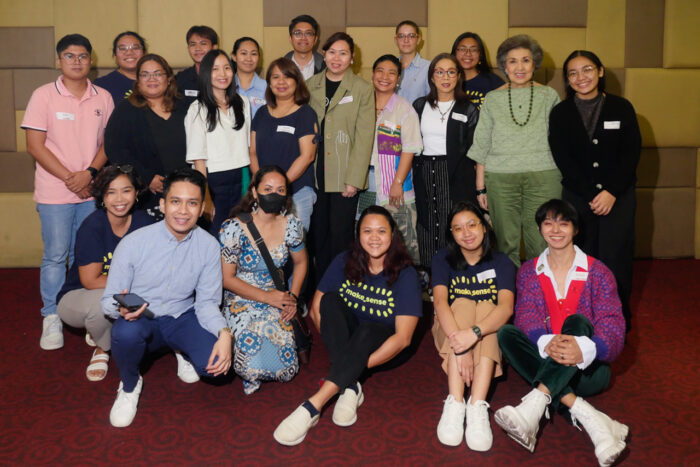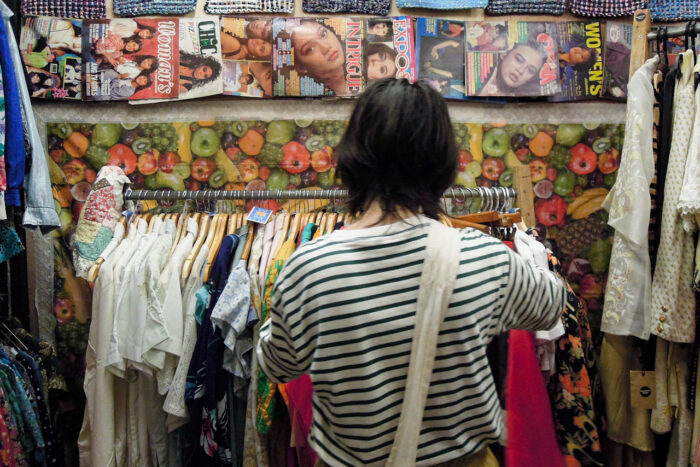The most anticipated and much-awaited event in VegFest 2023 is the VegFest Runway. A sustainable fashion show that has become a highlight of the festival. This year’s event resonated with creativity and resilience even in the face of a tropical storm. It showcased how fashion can contribute to preserving the environment and saving it from the climate crisis.
The VegFest Runway captivated a blend of innovative designs from three visionary fashion designers and a celebrity stylist. Together, they illustrated the impactful mantra of recycling, reusing, and reducing or the 3Rs. Through these compelling collections, the 3Rs define modern sustainable fashion.
A Showcase of Creativity and Sustainability
The first collection was called “Simply Trashion.” It captivated the audience with its transformative use of everyday recyclable materials. The designer turned empty plastic wrappers into stunning pieces. Shredded rice sacks were also used. They challenged conventional norms about waste by incorporating repurposed fabrics.
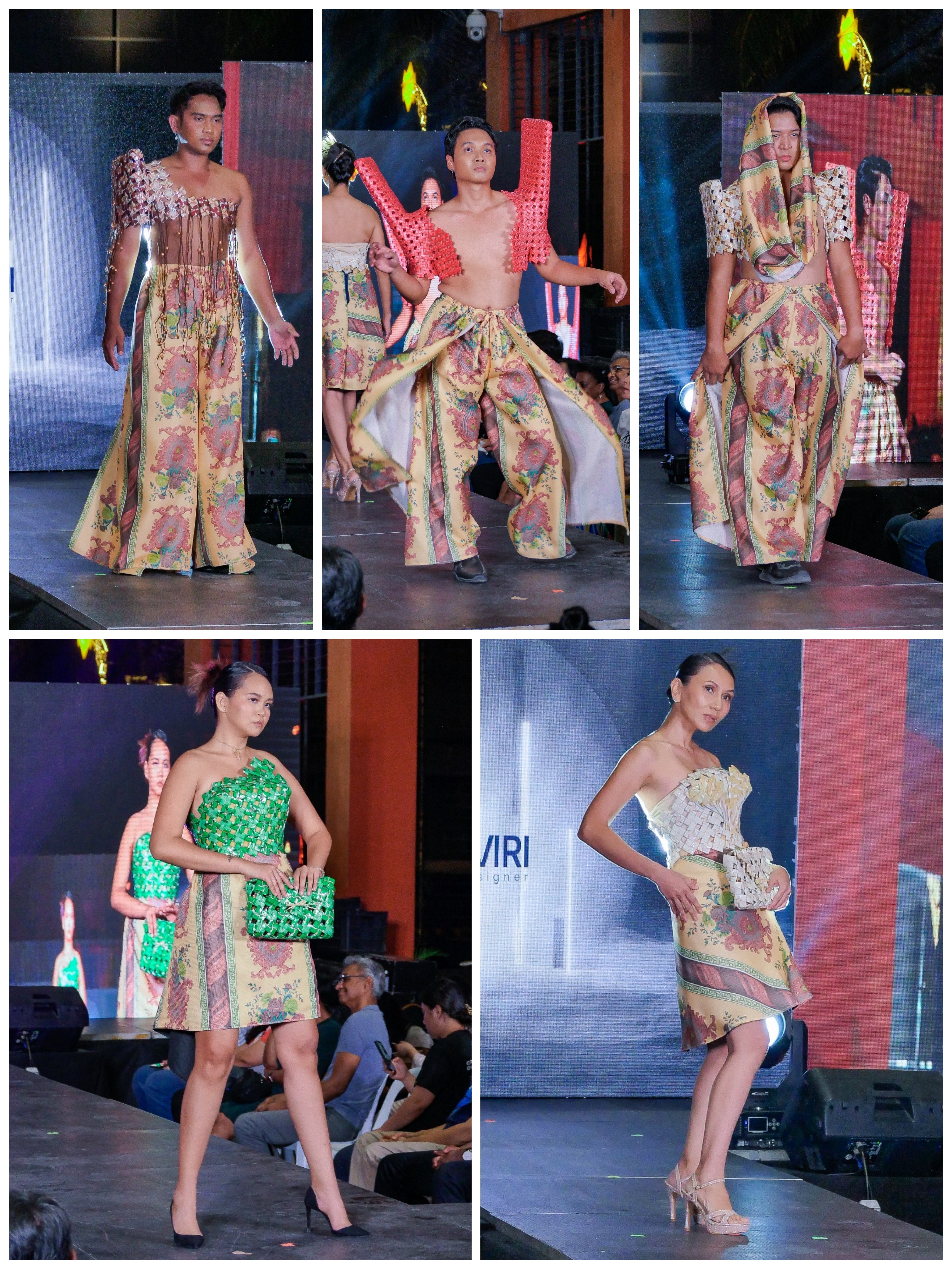
Leby Le Moría followed with a profound presentation. The attendees were treated to a collection that embodied years of introspection. The notion that vulnerability can be a source of strength is an inspiration. Each piece from her collection represented a chapter of her journey. Intricately woven with humanism and creativity.
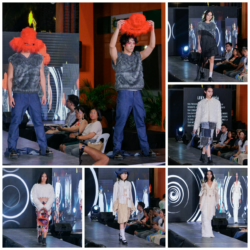
Next in line is Twinkle Ferraren’s Style Isle. The tropical landscapes of the Philippines influenced here we’ll renowned island wear designs. Putting together local artisans and indigenous tribes to encapsulate Filipino artistry. Ferraren’s collection showcased the rich Filipino heritage, and sustainably sourced textiles and accessories.
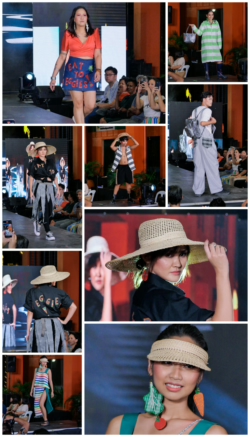
The show’s pulse quickened with celebrity eco-stylist and author Miss Kayce. She highlighted the vegan statement collection in advocating for positive change. Miss Kayce inspired the volunteer models to mix creatively and match pieces from their existing wardrobes. Aligned to their fashion choices with a vegan philosophy. A philosophy while promoting conscious consumerism.
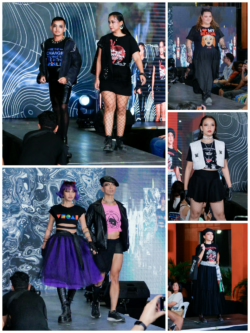
A Spotlight on Emerging Talents
The next day of VegFest 2024 is dedicated to students from SoFA Design Institute. They presented their unique street wear creations on the runway. Their instructor, Irene Grace Subang, guided their creativity to new heights. These budding designers utilized textile scraps donated by Barrios Studios.
Three esteemed experts in sustainable fashion judged the students. The judges are Prince Jimdel Ventura of Wear Forward, Buena Sawit of Barrios Studios, and celebrity stylist author Miss Kayce. They judged the students’ efforts across three categories: Best in Upcycled Construction, Most Innovative, and Best Collection. Additionally, the audience had the chance to vote for their favorite, culminating in an exhilarating People’s Choice award.
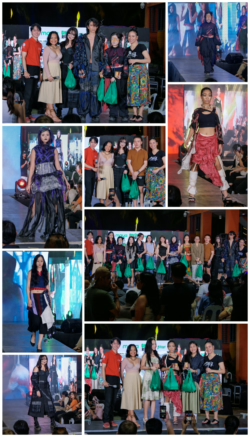
Embracing Eco-Consciousness
The VegFest Runway 2024 persevered to continue despite the looming threat of tropical storm Man-Yi. A powerful reminder of the fashion industry’s potential to drive environmental awareness. It served as a platform for creative expression and also as a conduit for inspiring actionable change.
VegFest Pilipinas, in collaboration with Fashion Revolution Philippines, reiterated its commitment to sustainable fashion. Leaving an indelible mark on the attendees and participants alike. The event successfully merged the worlds of fashion, environmentalism, and cultural heritage. It promoted a collective consciousness toward a more sustainable future.
As the final curtain fell, it was clear. The VegFest Runway has once again proved that style and sustainability can walk hand in hand. Where change is more than envisioned but it’s being woven into the very fabric of our lives.
Habi Philippine Textile Council (Habi) took a significant step to partner with Fashion Revolution Philippines (Fash Rev PH). They aim to promote sustainable and ethical fashion. They partnered for a series of engaging workshops during the Habi Market Fair. The event took place from October 18th to 20th, 2024, at the Glorietta Activity Center in Makati City. It highlighted the incredible talent of Filipino weavers. The beauty of natural textiles was also showcased. Additionally, the importance of supporting local brands was emphasized.
This partnership marked a first for Fash Rev PH. It merged their passion for ethical fashion with Habi’s dedication to preserving and promoting the heritage of Philippine textiles. The workshops were vibrant with creativity. They offered a unique opportunity for attendees to immerse themselves in the world of weaving. Additionally, they promoted sustainable practices.
The event kicked off with a captivating introduction to the art of weaving, led by Twinkle Ferraren. Participants experienced the joy of creating something with their own hands. This fostered a sense of accomplishment. It also sparked a creative fire within each attendee.
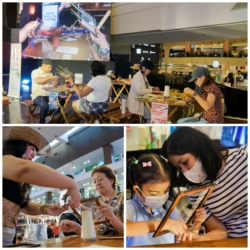
On the second day, Ili Likahaan led a mesmerizing Botanical Eco-printing workshop. Participants discovered the magic of transforming natural textiles using flowers and the rhythmic beat of hammers. This experience was not just about creating beautiful bandannas. It was a journey towards mindful crafting. It also served as a stress-relieving creative outlet.
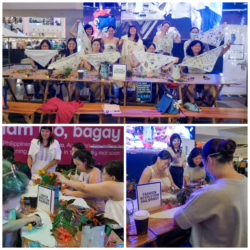
The final day of the workshops showcased the diverse facets of textile artistry. Hiwaga Hands taught participants the art of visible mending. They used techniques like patchwork, embroidery, and sashiko. These techniques breathe new life into fabrics. Meanwhile, The Art of Yarn introduced children to the world of weaving. They used a small loom. This offered a valuable lesson in the craftsmanship and dedication of local weavers.
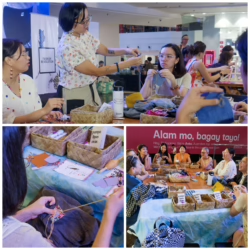
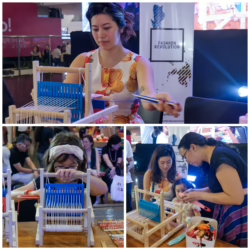
The workshops were a resounding success. Participants gained newfound skills. They also developed a deeper appreciation for the textiles they wear. Additionally, they established a connection to the rich heritage of Filipino weaving. This success demonstrates the power of collaboration. It highlights the growing movement towards conscious consumerism and ethical fashion in the Philippines. The success of this event is a beacon of hope. It inspires others to embrace sustainable fashion choices. It also encourages support for the talented artisans who bring these beautiful textiles to life.
Makati City, Philippines – In a groundbreaking collaboration, Fashion Revolution Philippines, iAcademy, and Lee Jeans Philippines have come together to create a unique and sustainable fashion collection. The project, dubbed “Segunda Mana,” showcases the power of upcycling and the ingenuity of Filipino design students.
A Second Life for Denim
Lee Jeans Philippines donated a trove of old denim stock to iAcademy, challenging the students to transform the materials into a modern streetwear collection. Under the guidance of fashion designer and teacher Irene Grace Subang, the students delved into the art of deconstruction and draping, using Filipino mysticism and superstitions as their inspiration.
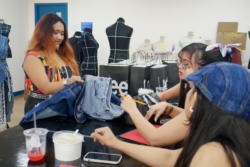
The “Segunda Mana” collection is a testament to the creativity and resourcefulness of the iAcademy students. By working exclusively with upcycled denim, they not only reduced their environmental impact but also created pieces with a unique story to tell. The collection’s intricate designs and thoughtful use of materials showcase the potential of sustainable fashion.
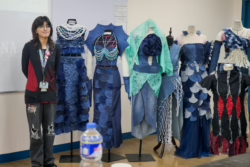
Showcasing Filipino Talent
A portion of the “Segunda Mana” collection was featured during iAcademy’s SODA Week, providing a platform for the students to showcase their work to a wider audience. The event culminated in a fashion show featuring designs from both current and former iAcademy students, highlighting the school’s commitment to nurturing young talent.
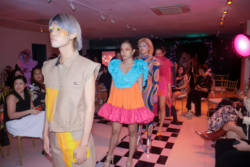
The collaboration between Fashion Revolution Philippines, iAcademy, and Lee Jeans Philippines is a significant step towards promoting sustainable fashion in the Philippines. By demonstrating the possibilities of upcycling and the creativity of Filipino designers, the project has the potential to inspire others to adopt more environmentally conscious practices.
Manila, Philippines – A unique blend of biking, art, and sustainability came together in a recent community event that empowered participants to create their own eco-friendly fashion accessories. The “Bike and Bandana” activity, hosted in Quezon City and Manila, offered a fun-filled day of cycling, eco-printing, and delicious organic treats.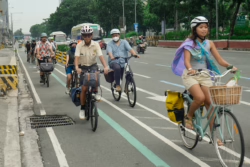 Participants began their journey at Centris Mall in Quezon City, where they embarked on a leisurely bike ride to Dangwa Market in Manila lead by Jeza Rodriguez. The market, known for its abundance of flowers, provided the perfect opportunity for participants to select their favorite blooms for their eco-printing project.
Participants began their journey at Centris Mall in Quezon City, where they embarked on a leisurely bike ride to Dangwa Market in Manila lead by Jeza Rodriguez. The market, known for its abundance of flowers, provided the perfect opportunity for participants to select their favorite blooms for their eco-printing project.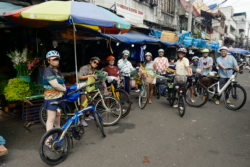 After gathering their floral treasures, the group cycled back to Quezon City and headed to the lagoon in UP Diliman. Here, under the guidance of artist Rosa Mirasol, participants learned the art of eco-printing. Using leaves, flowers, and a hammer, they imprinted their chosen designs onto pieces of linen, creating one-of-a-kind bandanas.
After gathering their floral treasures, the group cycled back to Quezon City and headed to the lagoon in UP Diliman. Here, under the guidance of artist Rosa Mirasol, participants learned the art of eco-printing. Using leaves, flowers, and a hammer, they imprinted their chosen designs onto pieces of linen, creating one-of-a-kind bandanas.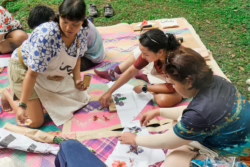 The eco-printing process not only allowed participants to express their creativity but also fostered a deeper connection with nature. By using natural materials and avoiding harmful chemicals, they created sustainable and personalized fashion accessories.
The eco-printing process not only allowed participants to express their creativity but also fostered a deeper connection with nature. By using natural materials and avoiding harmful chemicals, they created sustainable and personalized fashion accessories.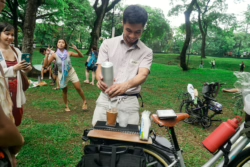 To fuel their creative energy, participants enjoyed a delicious spread of organic delicacies prepared by Lei Azarcon from Luntian Life. Pako salad, pastil, and Geno’s Gabi ice cream were just a few of the delectable treats that delighted taste buds.
To fuel their creative energy, participants enjoyed a delicious spread of organic delicacies prepared by Lei Azarcon from Luntian Life. Pako salad, pastil, and Geno’s Gabi ice cream were just a few of the delectable treats that delighted taste buds.
The “Bike and Bandana” event was a collaborative effort between Make It Safer Movement (MISMo), Bikeary Bicycle Lifestyle, BudolBuddy, and Fashion Revolution Philippines. This partnership brought together like-minded individuals who are passionate about sustainable living, community engagement, and creative expression.
As participants left the event with their newly created bandanas, they not only had a beautiful and unique accessory but also a sense of accomplishment and a deeper appreciation for eco-friendly practices. The “Bike and Bandana” activity was a resounding success, showcasing the power of community, creativity, and sustainability.
On May 19th, 2024, Rizal Park Luneta transformed into a vibrant canvas of culture and eco-consciousness. The National Parks Development Committee (NPDC) joined forces with Fashion Revolution Philippines, SoFA Design Institute, and Urban Sketchers Manila to present a unique Flores de Mayo celebration: Fashionista Flores de Mayo.
This exciting event wasn’t just about religious devotion or showcasing stunning gowns. It was a beautiful fusion of tradition and environmental awareness. SoFA design students presented modern Filipiniana gowns and suits, all crafted with sustainability in mind.
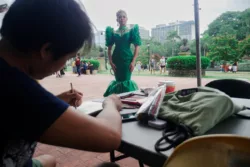 The festivities began at 5:00 pm, with Urban Sketchers Manila capturing the elegance of the “Reinas” (Queens) in their one-of-a-kind attire. As the day unfolded, the Santacruzan parade filled the air with a celebratory energy, snaking its way through the Central Section of Rizal Park.
The festivities began at 5:00 pm, with Urban Sketchers Manila capturing the elegance of the “Reinas” (Queens) in their one-of-a-kind attire. As the day unfolded, the Santacruzan parade filled the air with a celebratory energy, snaking its way through the Central Section of Rizal Park.
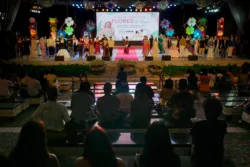
The highlight of the evening was the Santacruzan fashion show, held at the Open-Air Auditorium. Here, the public witnessed a modern interpretation of the Santacruzan tradition, where sustainable fashion took center stage.
But the sustainable fashion movement didn’t end there. From May 21st to 26th, an exhibit titled “Modern Filipin(ian)a: Reimagining Santacruzan Gowns” took place at The Gallery of Rizal Park Luneta. Visitors were invited to get a closer look at the eco-conscious gowns, sparking conversations about responsible fashion choices.
The Fashionista Flores de Mayo was a resounding success. It proved that cultural celebrations and environmental consciousness can go hand in hand, paving the way for a more sustainable future for fashion in the Philippines.
Isabela State University in Ilagan City is at the forefront of a textile revolution! The Philippine Textile Research Institute (PTRI) has set up a facility there to create yarn and thread from bamboo – a sustainable and versatile material.
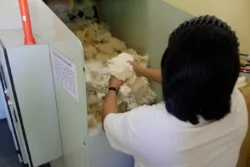
This isn’t just about replacing cotton with bamboo. PTRI is blending bamboo with cotton to create unique yarns perfect for clothing. Imagine – government uniforms made with Philippine-developed, eco-friendly bamboo fabric!

Ilagan City’s commitment to sustainability aligns perfectly with PTRI’s vision. The yarn production process is automated, minimizing waste. Plus, they cleverly recycle scraps into new threads! This innovative facility produces 50kgs of yarn every 8 hours, paving the way for a greener textile industry.
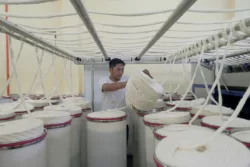
The future of textiles is being woven right here in Ilagan City, and it’s made from bamboo!
The Philippines’ longest-running vegan festival, Vegfest Pilipinas, recently celebrated its eighth year with a special event: the ReWork Runway. This eco-vegan fashion show showcased five collections of sustainable and ethical fashion, demonstrating the creativity and innovation that can be found in the world of plant-based clothing.
Why Vegan Fashion?
The fashion industry is a major contributor to environmental pollution, using vast amounts of water and chemicals to produce fabrics and dyes. It is responsible for the exploitation of animals, with leather and other animal by-products being used in clothing. Vegan fashion offers a more sustainable and ethical alternative, using plant-based materials and avoiding the use of animal products. It is a growing trend, with more and more people becoming aware of the environmental and ethical impact of their clothing choices.
The ReWork Runway
The ReWork Runway featured five collections from a variety of designers and brands:
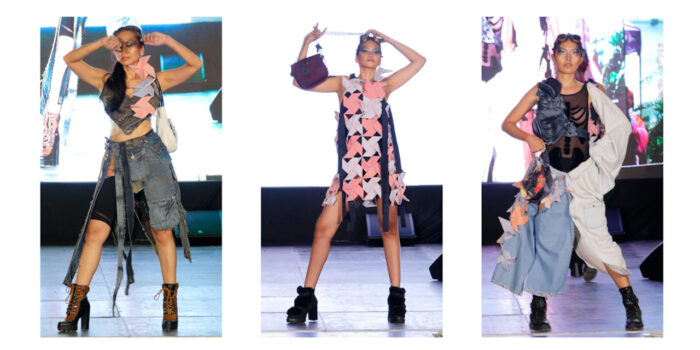
● Irene Grace Subang: A fashion designer and teacher who advocates upcycling. Subang’s collection showed how old denim and textile scraps can be combined to create new and exciting pieces. One of her eye-catching piece has a book leaf design on the right shoulder matched with the pinwheels patterns.
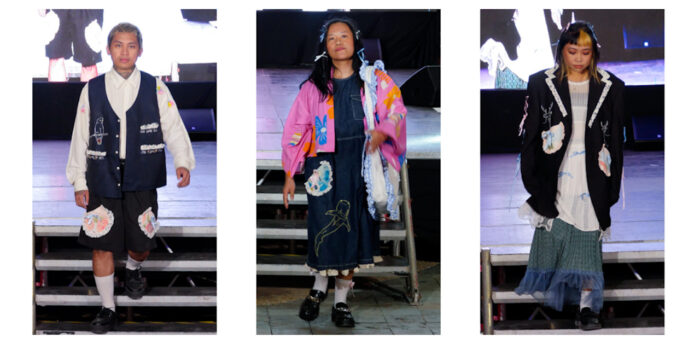
● Re.Clothing: A brand that embroiders and redesigns unwanted clothes to give them new life. The embroidery makes the clothes more personal for the wearer.
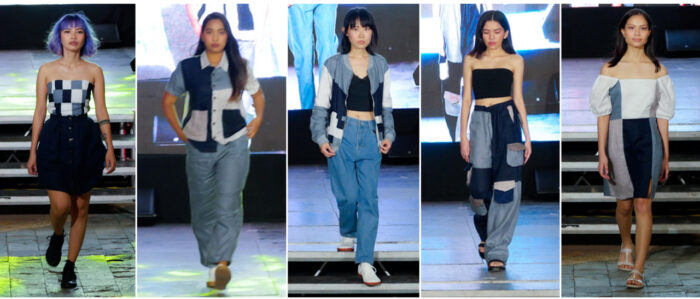
● TelaStory Collective: A brand that manufactures and sells garments that set a good living wage of their female artisans. Their clothing collection shows simplicity inspired from a checker design.
 ● ProjectPH: A brand that uses repurposed white flour sacks to create modern and stylish clothing. This practice dates back in late 1800s but trend went further in the 1929 Great Depression when women repurposed these while flour sacks into clothing.
● ProjectPH: A brand that uses repurposed white flour sacks to create modern and stylish clothing. This practice dates back in late 1800s but trend went further in the 1929 Great Depression when women repurposed these while flour sacks into clothing.
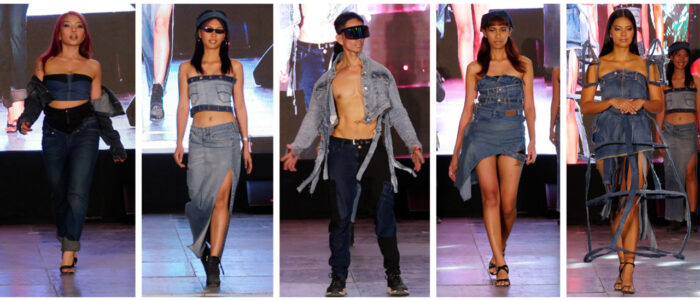
● Euphoria: Ella Alacron‘s collection, a designer whose collection showcased the versatility of denim. Alacron reveals her better woman in redesigning used denim to show more skin.
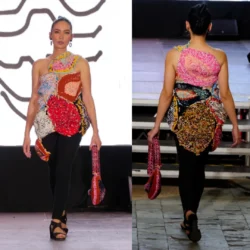 A special participation from Leby Le Moria. Her handwoven modular piece from off-cut fabric presented from the start of the runway.
A special participation from Leby Le Moria. Her handwoven modular piece from off-cut fabric presented from the start of the runway.
A Celebration of Creativity and Sustainability The ReWork Runway was a resounding success, demonstrating the potential of vegan fashion to be both stylish and sustainable. The collections showcased a variety of innovative designs and techniques, proving that there is no need to sacrifice style for sustainability. The event helped to raise awareness of the importance of ethical fashion choices. By highlighting the environmental and ethical impact of the fashion industry, the ReWork Runway encouraged attendees to make more conscious choices about the clothes they wear.
The Final thought
The ReWork Runway was a powerful event that celebrated the creativity and sustainability of vegan fashion. It showed that there is a growing movement of designers and brands who are committed to creating stylish and ethical clothing. As more and more people become aware of the importance of sustainable fashion, we can expect to see even more innovative and exciting designs in the years to come.
Did you miss some of the events that we got involved in this month? Not to worry, here is what we did early this October.
Fashion Revolution Philippines (FashRevPH) marked the World Circular Textile Day with a series of events. World Circular Textile Day is celebrated each year on October 8 but one day was not enough for this year 2023.
Exhibit and Bazaar at Eastwood Plaza
FashRevPH joins an exhibit and bazaar at Eastwood Plaza in Quezon City with WearForward and Restore. The event featured a well-curated selection of sustainable fashion brands, a clothing swap party with free consultation on sustainable fashion practices, and a showcase of upcycled pieces from Jan Paul Martinez, a local fashion designer. This activity ran from October 6 to October 10.
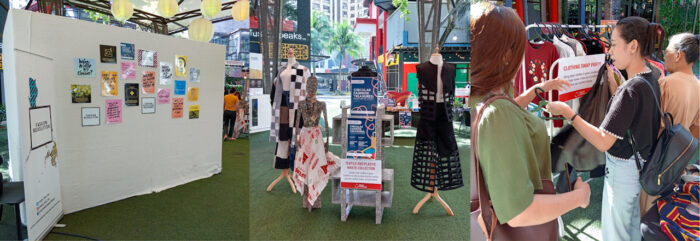
The Challenges and Opportunities in Textile Waste
Tere Arigo, FashRevPH Country Coordinator, facilitated the virtual panel discussion titled “Closing the Loop: Navigating the Challenges and Opportunities in Textile Waste.” Top industry figures from diverse backgrounds joins the panel discussion. The panel started off with FashRevPH spokesperson Prince Jimdel Ventura of WearForward followed by Noreen Baustista the co-founder of Panublix, joined with her is a fashion educator and sustainable designer Irene Subang, with a professional wardrobe stylist and author of Always Be Chic Miss KC Leyco and lastly Lester Dellosa an environment activist who is also the founder and creative director of CICCADA.
The time for discussion of environmental and economic challenges posed by textile wastes in the Philippines was not enough. It included the innovative solutions that can transform these issues into opportunities for circular fashion materials, processes, business models, products, services, and consumption were too broad to talk about in just an hour.
Capacity Building Workshop on Textile Circularity
FashRevPH collaborated with MakeSense Philippines in a Capacity Building Workshop on Textile Circularity on October 13, 2023. The workshop was held at BSA Twin Towers in Ortigas Center, Mandaluyong City.
FashRevPH participated in the workshop to talk about local textiles and sustainable fashion with Mr Ventura as part of the panel in the first part of the program. The organization guided the design of one of MakeSense’s capacity-building workshops in partnership with the United Nations Development Programme (UNDP).
FasRevPH’s Commitment to Sustainability
FashRevPH is committed to promoting sustainable fashion in the Philippines. The organization works to educate consumers about the impact of their fashion choices and to encourage them to support a more sustainable approach.
Manila, Philippines – Wine gets better with age and so does clothes where they gets fabulous with decades. That’s what vintage fashion is all about, give second chances to old clothes. The last Sunday of the May held a vintage community flea market where you can grab as many old clothes as you can.
The vintage community flea market ran a one day event on 28th of May 2023 called “Second Chances” at the Escolta street, Manila. The First United Building hosted the Second Chances event at the first floor. Appropriately, the vintage Art Deco building’s first floor housed the popular Berg’s department store before the malls where built. Now, a second chance to relive the popular department where you can wear all the old goodies that you can.
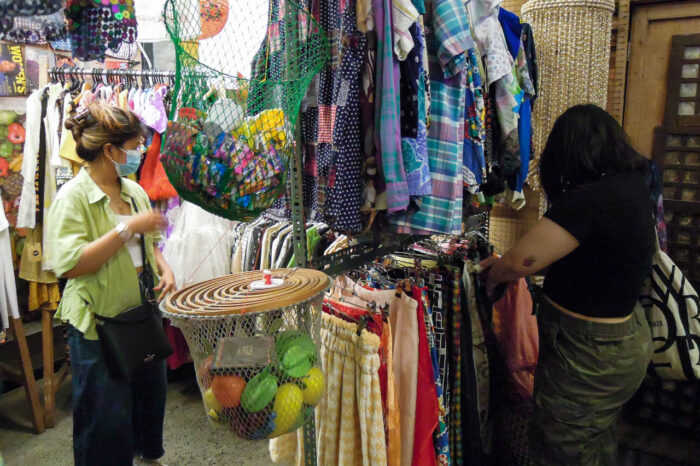
Bring back the good old times
A buffet of the rare, beautiful and luxurious old fashioned clothes from various pop-up stores to vintage vendors. Here you can find Glorious Dias and The Vintage Junkie Manila with pop-up stores Luntian Palamuti Atbp, Wear Kahel, RioTaso, Season Pass and so much more where they help the fashionistas find the those old gorgeous clothes to re-wear them. This vintage community brings back the fashion era from the 1960.
The moment you stepped in you are greeted with an atmosphere from the past. A past that screams with a visual feast of all the vintage clothes with the background music of Manila in the 1960s to 1970s. A fashionista gets drowned with so much choices from clothes to accessories. A feeling of endless creativity and that fashion could never die.
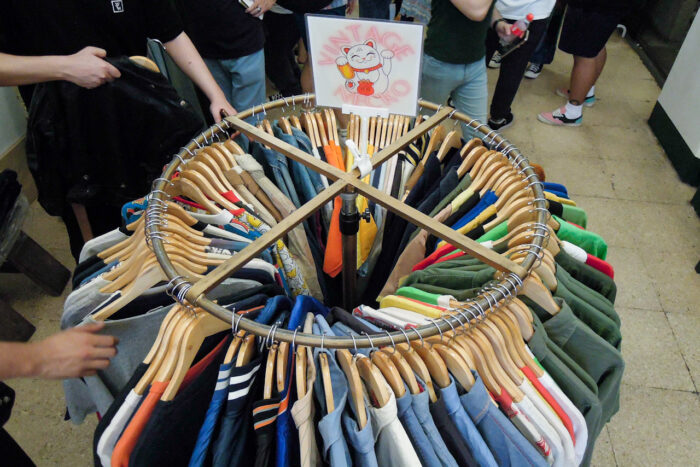
A Fashionista’s dream come true
Jodinand Villaflores Aguillon advocate of upcycled fashion and the owner of Glorious Dias have dreamt of this event for a long time and it finally happened with The Vintage Junkie Manila, Season Pass, Hub Make Lab, Pineapple Lab and The First United Building. A moment where everyone can be on a one stop shop of all vintage as a new fashion or a restyled new trend. People in this event may be unaware that they are already creating an impact. A gesture to buy these old clothes as to repurpose or upcycled already help reduce textile waste that has become one of the major impact to the environment. At the same time, the consumers learned to appreciate these clothes, the people who made them and ourselves. The Second Chances brought such awareness and impact in this small community.
Create a habit of awareness
This one day event created an echo of meaningful gesture. A gesture would hopefully allow modern consumers to understand the value of clothes and the people behind it. An aim to help create a shopper’s habit to spend less and buy smartly on their next fashion items.
Manila, Philippines – The Fashion Revolution Philippines commemorates the victims of the Rana Plaza factory collapse in Bangladesh, in alignment with the Fashion Revolution week held globally. The Rana Plaza factory collapse killed 1,138 textile workers and injured more people became an eye-opener to the world on 24 April 2013. The incident drove the Fashion Revolution movement to push for labor rights transparency and sustainability in the fashion world.
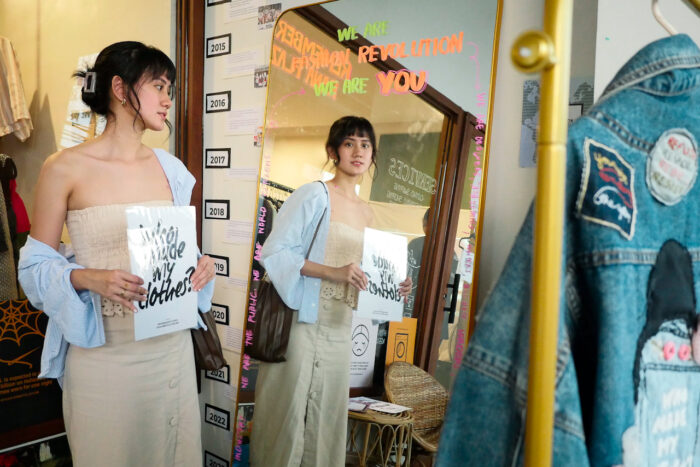
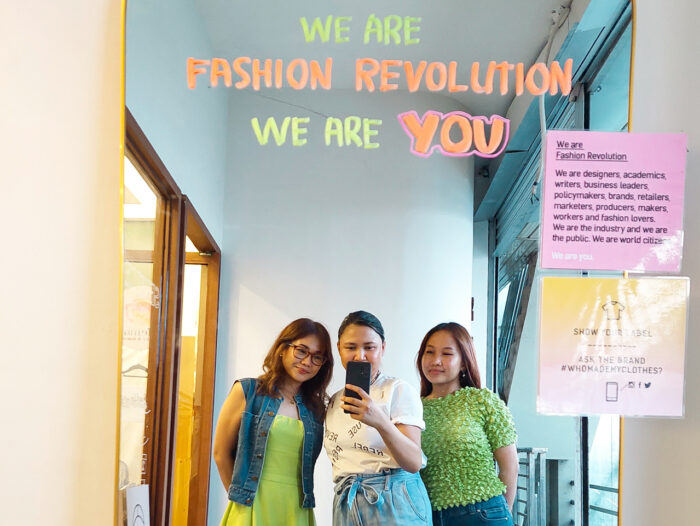
The Fashion Revolution Philippines’ first in-person event held for two days since the pandemic started. The two-day event happened in Moda Laya in commemoration of the 10 anniversary after Rana Plaza disaster. Attendees participated in activities such as clothes swapping, panel discussion with the experts and the screen showing of two documentary films.
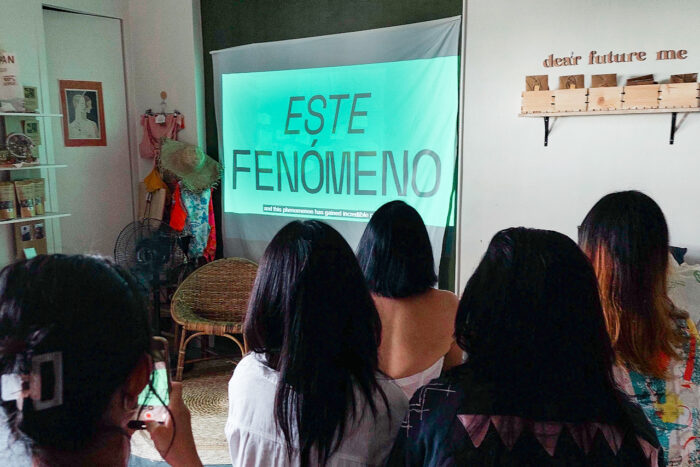
The “Se Abrió Paca,” a film made by the Fashion Revolution Guatemala, gave a heartfelt discussion among its viewers just after it was shown with the “True Costs” documentary and the power outage on the first day. Activities on the next day went well with the clothes swapping and panel discussion. Prince Ventura leads the panel discussion with Bianca Gregorio, owner of Moda Laya and founder of Re-clothing, Irene Subang, sustainable fashion designer and educator, and Jamie Naval, founder and CEO of Twenty Kids and Barrio Studios. Our guest experts discussed that the society today needs to focus on the importance of sustainable practices and a circular wardrobe.
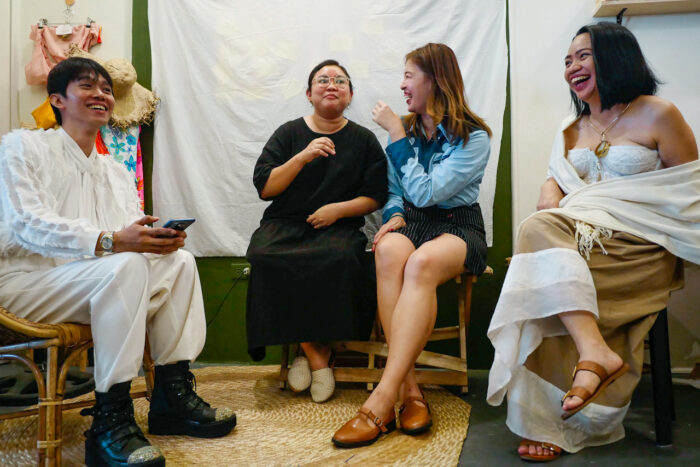
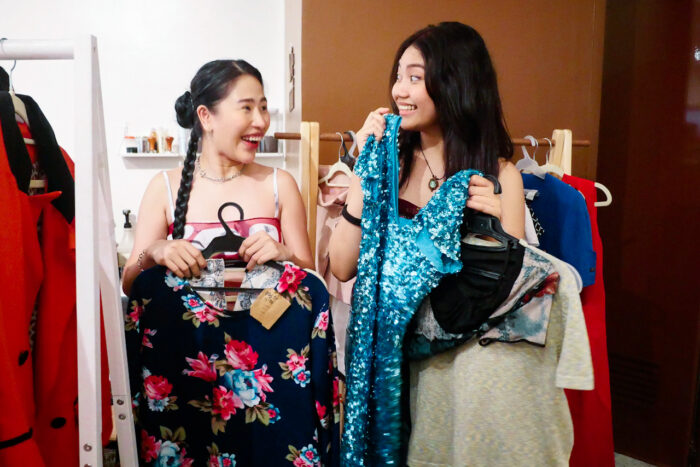
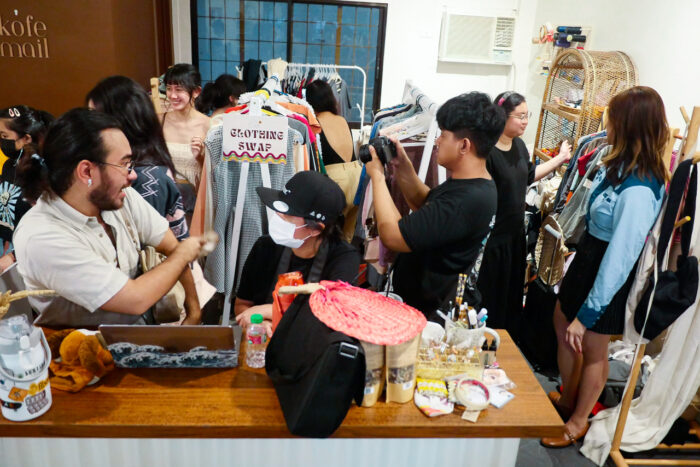
The Embassy of Italy in the Philippines together with Home Studio Inc. and with the collaboration of the Philippine Italian Association celebrate the Italian Design Day on 9 March 2023. The first Italian Design Day in the Philippines celebrated with the theme: “THE QUALITY THAT LIGHTS UP. THE ENERGY OF DESIGN FOR PEOPLE and ENVIRONMENT.”
Three masterclasses held before the awarding ceremonies. Masterclasses that presents interior design or product design, fashion, and architecture. The ma for fashion focused at a regenerative approach on sustainable fashion. Christine Cheryl Benet, a Chairperson of Benilde Fashion Design and Merchandising Program, conducts the fashion masterclass titled fashion: “Global Futures: moving towards sustainable fashion” that discussion beyond sustainable fashion.
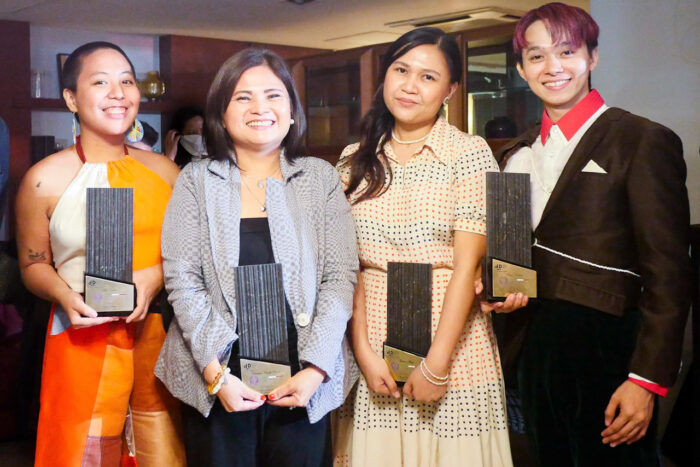
The main event honors 23 personalities both Filipino and Italian nationalities. The Italian Embassy honors personalities from the fashion industry that promotes sustainable and circular economy. The recognition is given to Christine Cheryl Benet, Rags 2 Riches, Rio Cuervo of Rio Taso, Prince Jimdel Ventura of Wear Forward and Spokesperson for Fashion Revolution Philippines, and Theresa Arigo for Fashion Revolution Philippines. The Fashion Revolution Philippines honored as an industry organization in fashion.
Congratulations to all the awardees who continue to promote transparency, sustainability and fair wage in the fashion industry.
The Corona Virus Disease 2019 (CoViD-19) pandemic has infected 3 million people and claimed 230 thousand lives worldwide. The lack of personal protective equipment (PPE) used by healthcare workers is one the challenges they face. The World Health Organization (WHO) has asked the different countries to manufacture more PPEs. In the Philippines healthcare workers are at a high risk. Most private hospitals use 10 to 15 PPE suits for one CoViD-19 patient in a week. While the Philippine General Hospital use 3 PPE suits also in a week. The PPEs can only be used for i a limited number of times.
People try to help by raising funds for more PPEs but manufacturers cannot cope up with the demand. The fashion community stepped up to help with the situation. These include the textile and garment workers, designers, artisans, and ordinary citizens who can sew PPE. The drawback is that many of them are not near medically standards and end up use by someone else.
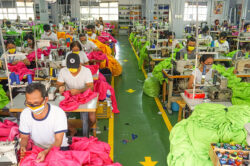
Volunteers sewing thousands of PPE suits, Photo courtesy of Abbey Balagbagan
Three students from Institute of Creative Entrepreneurship – Fashion and Design (ICE- FAD) have made PPEs based on the feedback they get from the healthcare workers to whom they donate it. Leilina Kate Yalung has made 300 washable face masks, Abbey Balagbagan has produce 20,000 face masks and 10,000 a two piece PPE suits since March 30 (as of April 21) will continue to do so until needed, and Erjohn dela Serna has made 982 pieces where he targets to create around 1,500. They have donated them to different barangays, Pasig City General Hospital, Child’s Hope Children’s Hospital, Cainta, Tarlac, Angeles, Pangasinan, Bacolod, Bulacan, and Navotas.
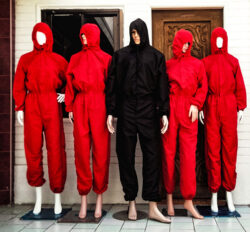
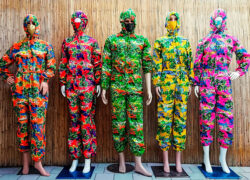
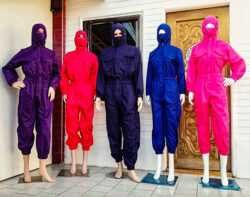
Erjohn dela Serna PPE suit designs
Kyra M. Mata has also donated 335 isolation (or hazmat) suits and 500 gowns. That went to the Southern Philippine Medical Center and other parts of Davao City with a project with Wear Forward called “Wear Together”. These hand-sewn suits are made from taffeta SBL (Silver Black Lining) the same material used for umbrellas. The patterns are cut to make sure they sew less and with a covering over the fly. They adjust the tension and make shorter stitches when sewing. Then do the water submersion test to check if they are air-tight. They sought advice from an Infectious Disease Specialist and help from Kendi Maristela, who teaches in the University of the Philippines (UP) Diliman College of Home Economics Clothing Tech Course, to make sure it is close to the medical-grade standard, which is a big challenge. She started the PPE design that is approved by the Department of Health (DOH). Another challenge supplies. They can only make as much as long the materials are available. They only use available stocks and rely on donations because they already spent enough money on their own.
The Manila Protective Gear Sewing Club was organized for the sole purpose of making these PPEs suits. They donate them to the Office of the Vice President (OVP) who has started aiding healthcare workers since the shortage through donation, collaboration, and calling for volunteers. It is through the OVP that they distribute the PPEs so there will be less hassle. According to Cynthia Diaz and Mich Dulce, of Manila Protective Gear Sewing Club, that there are no medical-grade fabrics or medical-grade production companies in the Philippines. In order to achieve the medical-grade standard, they consider every detail and the construction of the design that is reviewed and tested by a medical organization such as a hospital or an independent medical consultant. The design they have has been medically approved by the doctors behind the Open Source Covid19 Medical Supplies based in Berkeley, California.
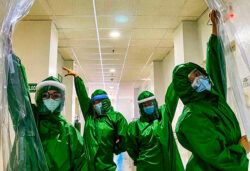
Healthcare workers trying out the donated PPE suits, Photo courtesy of Dr. Maria Almira Kiat
It is most rewarding to receive feedback from the different recipients of their donated PPE. Healthcare workers are overwhelmed that there are people like them willing to help in these times of crisis despite the restrictions imposed by the quarantine. They are also excited because of the different colors and designs of the PPE suit that is unusual to see. It also helps patients to recognize them which everyone is so grateful for. The advantage of these PPEs is that they are reusable and washable. According to Dr. Winston Pascual, who works in a public hospital with CoViD-19 patients, said that they are reusable and washable. They are cleaned by using bleach solution and bathe under the sun. Dr. Maria Almira Kiat, of Bataan General Hospital and Medical Center, said that as much as possible they autoclave besides washing. There are other areas where the healthcare workers are hesitant to autoclave them. The recipients of Kyra told her that even they have heat tested their PPE suits. Autoclave is one of the ways they can disinfect them properly, especially if used in direct contact with a CoViD-19 patient. Dr. Maria Almira said that they already have healthcare workers that got infected. That is why they categorize these PPE suits into two types A and B. The type A are inside wards that are in full gear or complete overall suits where they attend positive and suspected CoViD-19 patients. The other suits are considered type B where they use it outside the ward. These PPE suits are more comfortable compared to the ones procured from China by the DOH. Other countries have rejected these PPEs from China because they are defective.
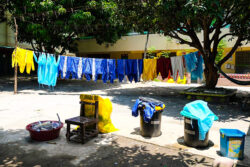
Donated DIY PPE suits are washed and sun dried, Photo courtesy of Kyra Mata
Despite the quarantine restriction people can still find a way to help in this time of crisis. It is people from the fashion community, from textile workers to designers, that can care for the needs of heroes who are the healthcare workers in the front line.
I like to end with a quote
“Fashion is the armor to survive the reality of everyday life.”
– Bill Cunningham.
